Modern logistics comprises operative logistics, analytical logistics and the management of dynamic logistic networks. The central task of operative logistics is the efficient supply of required goods at the right place in the right order at the right time. The tasks of analytical logistics are to design optimal supply networks and logistic systems, to develop strategies for planning, scheduling and operation, and to organize efficient order and performance processes. Logistic management has to plan, implement and operate the logistic network of a company and to schedule the orders, resources and inventories.This book about planning, management and operation of logistic systems and supply networks offers a unique survey of modern logistics. It contains methods, rules and tools for the solution of a broad variety of problems. The algorithms and formulas can be used for the computer-based planning of logistic systems and the dynamic scheduling of orders and resources in supply networks. The analytically derived rules, strategies, algorithms and formulas enable considerable improvements of performance, quality and costs of company logistics.
Their practical application is demonstrated by several examples from industry, trade and logistic service providers.Part 1 discusses Principles, Strategies and Organization and presents a top-down approach to macrologistics and micrologistics. Performance systems and dynamic networks are analyzed and the basic principles of logistics derived. The focus is on organization, scheduling and control, planning and realization, potentials and strategies, costs, pricing and marketing, time management and forecasting and on the scheduling of orders and inventories. Related topics are logistic units and master data, filling and packing strategies, limit performances and queuing effects and the connections between purchasing, sales and logistics. Part 2 investigates Systems, Networks and Operations and presents a bottom-up analysis of logistic networks made up from performance stations, transport connections and subsystems.At the basic level, the principles, strategies and methods of part 1 are applied to design, optimize and calculate storage systems, commissioning systems and transport systems. At the next level, logistic centers and production systems are considered.
At the highest level, logistic networks are designed and supply chains optimized. Results are general rules, approved strategies and practical recommendations for selecting, designing, planning and operating logistic networks and their subsystems. Further topics are logistic service providers and the role of people in logistics. The contents of this comprehensive and logically structured handbook are essential for logistic management and offer thought-provoking insights. An extensive index makes the book a dictionary of modern logistics.
- ISBN10 3540307222
- ISBN13 9783540307228
- Publish Date January 2009 (first published 1 January 2009)
- Publish Status Active
- Out of Print 8 June 2021
- Publish Country DE
- Publisher Springer-Verlag Berlin and Heidelberg GmbH & Co. KG
- Imprint Springer-Verlag Berlin and Heidelberg GmbH & Co. K
- Format Hardcover
- Pages 910
- Language English
